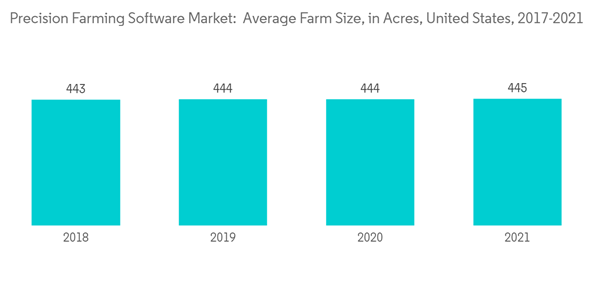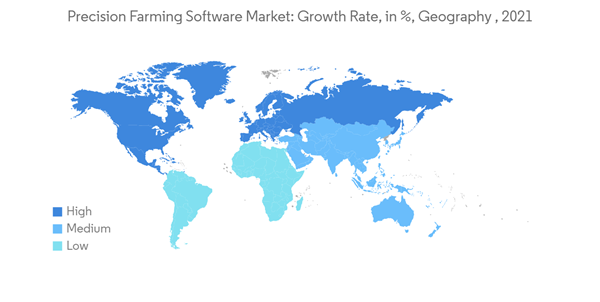Key Highlights
- The precision farming software market is projected to register a CAGR of 14 % during the forecast period.
- There is a need for digitization in every sector in order to cut costs and enhance productivity. The market for precision agriculture, including agriculture sensors, farming software, drones, etc., is also getting digitized to support the agricultural business. To help farmers remain protected from the impact of adverse price fluctuations of their produce, many agritech companies are coming up with innovative models for easing farming practices by focusing more on wireless platforms to enable real-time decision-making with respect to yield monitoring, crop health monitoring, field mapping, irrigation scheduling, harvesting management, etc.
- Increasing awareness about the benefits of precision agriculture in optimizing agricultural production has resulted in a great boom in the precision agriculture market. With the growing food demand, owing to the ever-increasing population, adopting precision agriculture tools is inevitable for farmers. The advancements and innovations in technology are the major factors driving the precision agriculture market, since they help farmers maximize their yield and minimize losses with efficient use of resources. North America is the largest and most mature market for precision agriculture, followed by Europe. Together, these two regions constitute a major share of the precision agriculture software market globally.
Precision Farming Software Market Trends
Farm Labor Shortage and Rise in Average Farm Size
The world has been witnessing an acute shortage of farm laborers. As per the database published by the World Bank, there has been an approximately 18% decline in employment in agriculture over the last decade. For the past ten years, farmers have faced a consistent labor shortage for various farm operations, which has led to an increased adoption rate of precision farming technologies, ensuring better farm resource management.Furthermore, the average farm size in the United States has constantly been increasing since 2017. At the same time, the total number of farms declined by approximately 1.5% to 2,012,050 in 2021 as compared to 2017. The large-holding farmers have, therefore, grown well-positioned to use precision farming software to automatically identify field surroundings and respond to variations. As a result, the shortage of farm labor and rising average farm size are expected to drive the adoption rate of precision farming technologies among farmers. This boosts the overall precision farming software market during the forecast period.
North America to Dominate the Precision Farming Software Market
North America is one of the most important regions in terms of the precision farming software market. The farmers in the region are well-educated and increasingly adopting advanced farming systems, mobile applications, cloud services, farm management software, imagery services, and data analytics services. Furthermore, North America has received the major share of the precision agriculture market due to the increasing adoption of high-level agricultural equipment and solutions, such as steering, sensors, and guidance systems.The country leads the market in this region due to the presence of many critical manufacturers of high technologies. Wide Area Augmentation System (WAAS), a GNSS-based solution, is the most popular technology in North America and has achieved 66% market penetration. The North American market has a high potential for satellite-based devices and equipment. The increasing demand for real-time kinetic technology, fertilizer and sprayer controllers, robotics, variable rate irrigation, networks, and remote sensing technologies primarily accelerates market growth. Deere & Company, Trimble, Inc., AgJunction, Inc., and Raven Industries are some precision agriculture software-based companies in the US market.
Precision Farming Software Market Competitor Analysis
The market is highly fragmented, with various small and medium-sized companies and a few big players, resulting in stiff competition. This is one of the major factors for the fragmented nature of the market. The major players in the market include AGCO Corporation, IBM, John Deere, Bayer CropScience AG, and Fairport Farm Software. Furthermore, these players are focusing on constant R&D and expanding their geographical presence. New product launches, partnerships, and expansions are the major strategies adopted by these players.Additional benefits of purchasing the report:
- The market estimate (ME) sheet in Excel format
- 3 months of analyst support
This product will be delivered within 2 business days.
Table of Contents
Companies Mentioned (Partial List)
A selection of companies mentioned in this report includes, but is not limited to:
- AG DNA
- AG Junction
- AG Leader Technology
- AGCO Corporation
- Agribotix
- Bayer CropScience AG
- Case IH Agriculture
- ClearAg Operations
- Conservis Corporation
- Deere & Company
- Fairport Farm Software
- IBM
- Mapshots Inc.
- Raven Industries
- Topcon Positioning Systems
- Trimble Inc.










